Michael Dibdin - End games
Here you can read online Michael Dibdin - End games full text of the book (entire story) in english for free. Download pdf and epub, get meaning, cover and reviews about this ebook. genre: Detective and thriller. Description of the work, (preface) as well as reviews are available. Best literature library LitArk.com created for fans of good reading and offers a wide selection of genres:
Romance novel
Science fiction
Adventure
Detective
Science
History
Home and family
Prose
Art
Politics
Computer
Non-fiction
Religion
Business
Children
Humor
Choose a favorite category and find really read worthwhile books. Enjoy immersion in the world of imagination, feel the emotions of the characters or learn something new for yourself, make an fascinating discovery.

- Book:End games
- Author:
- Genre:
- Rating:3 / 5
- Favourites:Add to favourites
- Your mark:
- 60
- 1
- 2
- 3
- 4
- 5
End games: summary, description and annotation
We offer to read an annotation, description, summary or preface (depends on what the author of the book "End games" wrote himself). If you haven't found the necessary information about the book — write in the comments, we will try to find it.
End games — read online for free the complete book (whole text) full work
Below is the text of the book, divided by pages. System saving the place of the last page read, allows you to conveniently read the book "End games" online for free, without having to search again every time where you left off. Put a bookmark, and you can go to the page where you finished reading at any time.
Font size:
Interval:
Bookmark:
Michael Dibdin
End games
The ferocious character of the Barbarians was displayed, in the funeral of a hero, whose valour, and fortune, they celebrated with mournful applause. By the labour of a captive multitude, they forcibly diverted the course of the Busentinus, a small river that washes the walls of Cosentia. The royal sepulchre, adorned with the splendid spoils, and trophies, of Rome, was constructed in the vacant bed; the waters were then restored to their natural channel; and the secret spot, where the remains of Alaric had been deposited, was for ever concealed by the inhuman massacre of the prisoners, who had been employed to execute the work.
Edward Gibbon, The Decline and Fall of the Roman Empire
The dead man parked his car at the edge of the town, beside a crumbling wall marking the bounds of a rock-gashed wasteland of crippled oaks and dusty scrub whose ownership had been the subject of litigation for over three decades, and which had gradually turned into an unofficial rubbish tip for the local population. The arrival of the gleaming, silver-grey Lancia was noted by several pairs of eyes, and soon known to everyone in the town, but despite the fact that the luxury saloon was left unguarded and unlocked, no attempt was made to interfere with it, because the driver was a dead man.
The only ones to see him close to were three boys, aged between five and ten, who had been acting out a boar hunt in the dense shrubbery under the cliff face. The five-year-old, who was the prey, had just been captured and was about to be dispatched when a man appeared on the path just a few metres away. He was in his fifties or early sixties, of medium stature, with pale skin and a shock of hair that was profuse and solidly black. He wore a black suit of some cheap synthetic fabric, and a wide collar, almost clerical, but matt and black, encircled his neck. From it, beneath the throat, hung a large metal crucifix. The mans chest and feet were bare. He trudged silently up the steep path towards the old town, looking down at the ground in front of him, and showed no sign of having seen the trio of onlookers.
As soon as he was out of sight the two younger boys were all for following him, scared but daring each other not to be. Sabatino, the eldest, put paid to that idea with a single jerk of the head. No one had confided in him about this event, but the community in which they all lived was a plangent sounding board when it came to news that might affect its members. Sabatino hadnt heard the primary note that must have been struck somewhere, but he had unconsciously absorbed the secondary vibrations resonating in other parts of that complex instrument. Danger! they had whispered. Lie low, keep away, know nothing. Discarding his role as the renowned and fearless hunter of wild boar for that of the responsible senior child, he rounded up his friend Francesco and the other boy and led them down a side path back to the safety of the town.
The sole witness to what happened next was a figure surveying the scene through binoculars from a ridge about a kilometre away on the other side of the valley. The dead man followed the track until it rose above the last remaining trees and ceased to be a rough line of beaten earth and scruffy grass, to become a stony ramp hewn out of the cliff face and deeply rutted by the abrasive force of ancient iron-rimmed cart wheels. By now il morto was clearly suffering, but he struggled on, pausing frequently to gasp for breath before tackling another stretch of the scorched rock on which the soles of his feet left bloody imprints. Above his bare head, the sun hovered like a hawk in the cloudless sky.
The isolated hill he was climbing was almost circular and had been eroded down to the underlying volcanic core and then quarried for building materials, so that in appearance it was almost flat, as though sheared off with a saw. When the dead man finally reached level ground, he collapsed and remained still for some time. The scene around him was one of utter desolation. The vestiges of a fortified gateway, whose blocks of stone had been too large and stubborn to remove, survived at the brink of the precipice where the crude thoroughfare had entered the former town, but looking towards the centre the only structures remaining above ground level were the ruins of houses, a small church, and opposite it an imposing fragment of walling framing an ornate doorway approached by five marble steps. All around lay heaps of rubble with weeds and small bushes growing out of them. The rounded paving stones of the main street were still clearly visible, however, and the dead man followed them, moaning with pain, until the cobbles opened out into a small piazza.
He then proceeded to the church, bowing his head and crossing himself on the threshold. Ten minutes passed before he emerged. He stopped for a moment to stare up at the massive remnants of stone frontage which dominated the square, then crossed over to the set of steps leading up to the gaping doorway, knelt down and slowly crawled up the steps on his knees, one by one, until he reached the uppermost. A wild fig tree had established itself in the charred wasteland within the former dwelling, feeding on some hidden source of water far below. The dead man bent over it and kissed one of its leaves, then bowed down until his forehead touched the slightly elevated doorstep.
The man watching from the ridge opposite put down his binoculars, lifted what looked like a bulky mobile phone off the dashboard of the Jeep Grand Cherokee beside him, extended the long recessed antenna and then pressed a button on the fascia. The resulting sound echoed about the walls of the valley for some time, but might easily have been mistaken for distant thunder.
A forkful of food stilled between the plate and his mouth, Zen sat watching the man at the next table. His gaunt, angular head looked as though it had been sculpted with a chainsaw from a knot-ridden baulk of lumber, but Zen was waiting for it to explode. Both men had ordered the trattorias dish of the day, but Zens neighbour had then demanded pepe. This duly arrived, in the form of three fresh chilli peppers the size of rifle cartridges. He proceeded to chop them roughly and scatter the chunks over his pasta, seeds and all, before stirring the mass together and tucking in.
As so often since his transfer to Cosenza, Zen felt seriously foreign. He knew that if he had eaten even the smallest fragment of one of those peppers, he would have suffered not merely scorched taste-buds but also sweaty palpitations like those preceding a cardiac arrest, leaving him unable to eat, drink, talk or even think for at least fifteen minutes. His neighbour, on the other hand, chomped them down without the slightest change of expression. That grim countenance would never betray any emotion, but he appeared content with his lunch.
Zen toyed with his own food a bit longer, then pushed the plate away. Knobs of mutton knuckle protruded from the gloggy local pasta smothered in tomato sauce. Not for the first time, he asked himself how this bland yet cloying fruit had come to stand as the symbol of Italian cuisine worldwide, despite the fact that until a century or so ago very few Italians had even seen a tomato, never mind regarded them as a staple ingredient in every meal. As recently as his own childhood in Venice, they remained a rarity. His mother had never cooked them in her life. Roba del sud, she would have said dismissively, southern stuff.
Which, of course, was the answer to Zens question. The Spanish had introduced the tomato from their American empire to their dominions in southern Italy, where it grew like a weed. The historic waves of Italian emigrants from the south had virtually subsisted on this cheap and abundant foodstuff, whose appearance conveniently recalled the images of the Sacred Heart of Jesus which hung on their walls, and on the bottled sauce that could be made from it to last year round. They had adopted it as a symbol of their cultural heritage and identity and then sold it to the credulous foreigners among whom they lived as the very essence of Italian cuisine.
Font size:
Interval:
Bookmark:
Similar books «End games»
Look at similar books to End games. We have selected literature similar in name and meaning in the hope of providing readers with more options to find new, interesting, not yet read works.
Discussion, reviews of the book End games and just readers' own opinions. Leave your comments, write what you think about the work, its meaning or the main characters. Specify what exactly you liked and what you didn't like, and why you think so.



